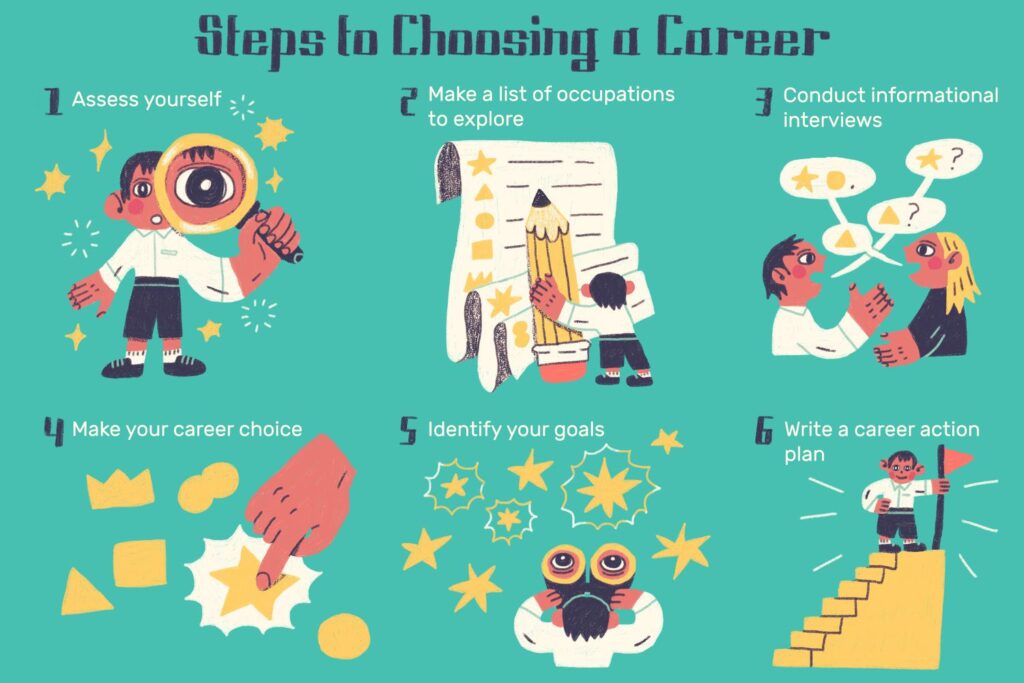In the article “Stages in career development” I tried to show you what stages each person’s career generally goes through. How to manage your own career
These stages can be taken as a good starting point in career management, because the different stages we go through require different actions from us to be able to claim that we are actually managing our career and not just looking for a job or going to work .
İçindekiler
How to manage your own career
Here are some tips that can help you manage your career:

1. To start self-managing your career, first make a plan.
Like most plans, a career plan consists of three parts:
- Where am I now?
The answers to this question will help you look into yourself and self-analyze. The more honestly and frankly you “look” at yourself and self-evaluate, the more realistic your self-analysis will be.
You are asked to answer several questions: what are your achievements so far, what is the harmony between your personality and the work you do or want to do, what is it that you can do well at work and what is it that you do not you can do well, what are your lessons about how you have searched and found work so far. How to manage your own career
- Where do I want to be?
The answers to this question will help you plan your career goal – what career do you want, how do you see yourself in 2, 5, 10 years, what do you expect from your career.
- How will I achieve my career aspirations?
The answers to this question will help you plan the appropriate actions and resources needed to realize your goals, for example, training, qualifications, work experience, network of contacts, money needed, time, information sources, etc.
I personally advise you to write your plan (1-2 pages are enough) and always have it “at hand” next to you.

2. After drawing up the plan for your career, start organizing your actions.
As with any organizational work, several things are required here:
- To explore different possibilities
If you work – carefully check the opportunities for trainings and educations in the company. Familiarize yourself with the Labor Code, the Rules of Procedure. Study your job description flawlessly and pay attention to the end results that are expected of you.
If you are going to study at a university – carefully familiarize yourself with the offers of various specialties and the content of the qualification characteristics. Further explore the opportunities for student internships in companies. In most cases, they can be a springboard to the next more serious job offer if you perform well. How to manage your own career
- To take the necessary actions
This very quickly turns your ideas, wishes and ambitions into real actions.
If you work – try to learn and do your job perfectly. Participate in all appropriate in-house trainings and educations, as they should generally contribute a lot to your career development.
If you have decided to become a student – start preparing for candidate student exams on time.
If you are a student, focus on preparing for seminar classes, exams, etc., because the educational institution is the place where you lay the foundations of your career. Read literature and don’t settle for just lecture notes. Inquire about study opportunities under various student mobility programs. Visit the Careers forums. Keep track of what’s new you’ve learned. How to manage your own career
- To create and maintain a personal network of relationships
If you work – don’t forget the relationships with colleagues, clients, partners, your family, relatives and friends who build your “network”. You cannot do without it, because you do not live in isolation – this is how the life of modern people is structured. Your most important helper in creating and maintaining this network is social skills. Unfortunately, we are not born with ready-made social skills. We have to study them. Therefore, any education or training on the subject of “social skills” is very useful for the career. How to manage your own career
If you are a student – social skills will help you build and maintain your “network” with colleagues from the group and colleagues from other specialties, with teachers, with companies that offer internships for students, etc.

3. Both career planning and organizing your various career initiatives are only possible thanks to your personal leadership (inner leadership).
Inner leadership is a collection of ideas, self-inspiration and impulse.
- Constantly make inferences about yourself, about career, about other people and their careers by comparing yourself – what is your career perspective and what is their perspective, how you think and how they think, how you act and how they act. Summarize your lessons.
- Do not copy someone else’s experience, but think carefully about how certain “other people’s” actions would fit into your career plan, in your scheme of actions, whether the “other people’s” actions are in sync with your personal values.
- Think creatively. The characteristics of each subject, for example, could “tell you” what you are aiming for or what you should do career-wise. Your personal bag, for example, is large and comfortable. Associate these characteristics of her with your career actions – for example, are these actions of yours “big” enough to please you, to be “comfortable”?!
- Try to always look for an answer to the question of what it is that you like and greatly excites you. Emotion, feelings and more permanent attitudes influence thinking and in this sense are a guide for your future actions. How to manage your own career
- Always explain to yourself the reasons for certain actions. This will motivate you. Look for the explanation through personal needs – for food, shelter, clothing, for security, for commitment to something (belonging to a certain group of people), for the exercise of power, for achievements, for self-realization, etc.

4. Now is the time to think about how you will take control of your career development.
- First of all, you need to think in advance what you will accept as your personal career achievements and how you will “measure” the achievements.
If you work – you should know what is accepted by the company as an “achievement” – “number of clients served”, “number of concluded deals”, “employee of the month”, etc. How to manage your own career
And if you are a student – in my opinion, achievements should be related to “increasing and deepening knowledge”, “expanding and improving skills”, “creating and maintaining the social network”.
- Adjust the original career plan if you have significant differences between “accomplishments” and “goals”. We are all aware that not everything can be predicted. If you periodically monitor the career plan, you can control it (are you moving towards the goal, are the actions you perform appropriate, are the resources you use appropriate) and make decisions about new actions and resources that are more appropriate to the situation.
We recommend you to see our articles in the how to make category that we have prepared for you.





Yorumlar (1)